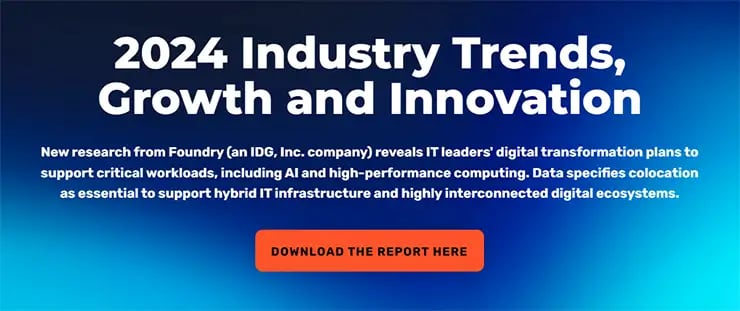
Why Colocation Data Center Compliance Creates Customer Value
When colocation data centers are compliant, customers can operate with the confidence that their colocated business is compliant. But there’s more to the story. Compliance influences service delivery and adds value beyond certifications.
Regulations, standards and compliance frameworks such as SOC1 Type 2, SOC2 Type 2, ISO 27001, NIST 800-53, PCI DSS, and HIPAA set targets against which data center operations can be assessed. Independent auditors conduct annual examinations, which focus on items such as processes, employee training, technical operations, incident management, use of best practices and security controls.
Benefits of Data Center Compliance
Forty-nine percent of enterprises already include colocation in their hybrid IT mix, and 51 percent colocate to increase security, according to IDG’s 2021 State of the Data Center Report¹. Further, colocation is on a positive growth trajectory – projected to increase approximately 13 percent by 2028². Clearly, colocation already is a centerpiece of hybrid IT strategies. And given the number of customers motivated by security, compliance plays a large role in customer satisfaction.
Some people view compliance with regulations, standards or frameworks as parallel tracks of effort. After all, each examination leads to certification or remediation if something isn’t up to par. But collectively, the entire compliance program is much greater than the sum of the parts. Let’s look at a few ways in which compliance benefits colocation customers:
- Reduce operational risk. Compliance reinforces the operating principle of consistency. The use of consistent procedures, controls, best practices and clear documentation helps minimize human errors, technical issues or gaps that can introduce vulnerabilities. In a buttoned-up data center facility, everyone is clear about roles and responsibilities. Should something happen, people know what to do to recover smoothly and quickly. Any amount of risk reduction is worthwhile.
- Increase accountability and efficiency. A data center’s compliance experts typically are dedicated to compliance. They can take a broad view to identify common requirements and understand which processes and controls support multiple regulations, standards and frameworks. The more they see the big picture, the more efficient their efforts to collect the necessary data, participate in examinations, establish metrics and set expectations. These efforts help to ensure that examinations proceed smoothly and successfully – delivering “continuous peace of mind.”
- Anticipate customer needs. Think about some of the factors that IT decision makers need to consider: the head-spinning rate of technology change, digital transformation pressures, competitive pressures, data privacy laws and sustainability objectives, to name a few. Colocation data centers are motivated – reputation and revenue are at stake! – to anticipate customer needs by following trends and their implications for hybrid IT deployments. Passing regulatory examinations successfully year after year is one signal that a data center is keeping up on changing regulations and watching out for its customers. Certain colocation providers may go the extra mile to collaborate proactively with customers who are debating infrastructure decisions and plans that involve cloud services, interconnection and/or an ecosystem of potential business partners.
- Guide investment and innovation plans. To remain relevant, colocation providers develop roadmaps that reflect forward-thinking about compliance, technology, services and customer priorities. Regulations, standards and frameworks – whether for physical security, cybersecurity, data privacy or operations – will only require “more and better” in terms of processes, controls, power options, network options and so on. Smart data center providers will stay ahead of the curve and strategize how and when to invest in new products and services. Some innovation may line up with expected regulatory changes, and other innovation may support customer priorities such as environmental, social and governance (ESG) initiatives. One of CoreSite’s focus areas, for example, is sustainability – particularly energy efficiency initiatives.
Compliance, a Pillar of Hybrid IT and So Much More
As IT leaders consider their hybrid IT infrastructure options, compliance is top of mind. The knowledge that a colocation data center is regularly and rigorously examined reassures decision makers about a provider’s operational excellence in facilities that house critical data, applications and hardware. But compliance also is a way of thinking, a discipline, that adds value in areas such as risk reduction, accountability, efficiency, service/product mix and innovation.
Read about CoreSite compliance certifications and standards or ask your CoreSite sales representative for more information.









